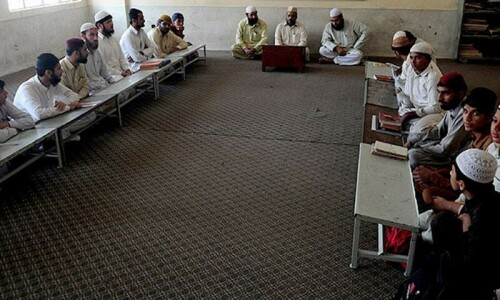QUETTA: The media situation in Balochistan is alarming, says the Human Rights Commission of Pakistan (HRCP).
Addressing a press conference at the Quetta Press Club on Thursday, seasoned human rights activist I.A. Rehman regretted that the so-called mainstream media gave Balochistan the same treatment as the state media did.
“The government of Pakistan has always treated Balochistan as a conflict zone,” he said, adding that’s why truth did not come out of Balochistan.
Husain Naqi, HRCP secretary Harris Khalique, Zahoor Ahmad Shahwani, and Habib Tahir were also present at the press conference.
At the provincial launch of its flagship annual report ‘State of Human Rights in 2018’, the commission voiced its concern on five points relating to Balochistan.
It notes that, in a year of general elections, it was perhaps inevitable that the progress and observation of human rights issues might be suspended, if not forgotten altogether. The elections themselves were plagued by allegations of pre-poll manipulation and rigging as well as some appalling outbreaks of violence, notably in Mastung and Quetta, which left at least 180 people dead.
The report notes that sectarian violence in Balochistan has disproportionally targeted the Shia Hazara community. In Quetta, they remain confined to Hazara areas: their movement is restricted as is their access to markets and schools. The state’s response has been to establish security convoys that accompany members of the community when they leave Hazara areas, but this does not guarantee their security and is, arguably, a short-term solution to sectarian violence in the province.
Citing the Baloch Human Rights Organisation and Human Rights Council of Balochistan, the HRCP report states that at least 541 partial reports of enforced disappearances surfaced in 2018. In August 2018, the Chairman of the Commission of Inquiry on Enforced Disappearances said that ‘merely 131 cases’ of missing persons in Balochistan were heard. The lack of more comprehensive official data on enforced disappearances — and Balochistan media’s apparent powerlessness to report on these — is a poor reflection on the state’s political will to eliminate this scaring problem.
The report also notes that malnutrition is still a serious threat to children’s health in the province, to the extent that a malnutrition emergency was declared in Balochistan in November last year by the provincial health minister.
While a nutrition cell was established to address chronic malnutrition, the state must prioritise and sustain its efforts to protect one of Balochistan’s most vulnerable segments.
Published in Dawn, August 23rd, 2019















































Dear visitor, the comments section is undergoing an overhaul and will return soon.